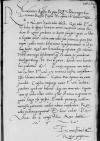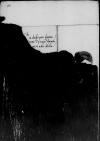Letter #2962
Sigismund II Augustus Jagiellon to Ioannes DANTISCUSVilnius, 1546-05-02
Manuscript sources:
| ||||
Text & apparatus & commentary Plain text Text & commentary Text & apparatus
[Reveren]do in Christo Patri, domino
Reverende in Christo Pater, sincere nobis dilecte.
Quae nobis Paternitas Vestra his diebus de offensis hominum animis concessione arcium
Pucense negotium cum antea tum ex litteris Paternitatis Vestrae ex sententia nostra confectum esse libenter audimus. Cetera Deus optimus maximus secundet. Consilia scriptaque omnia Paternitatis Vestrae multum ponderis apud nos habent, idque non immerito. Cognita enim est nobis illius virtus, fides et rerum magnarum cognitio, longo usu quaesita. Proinde quaecumque nostra interesse putaverit, scribat velimus confidenter, rem nobis factura pergratam. Et bene valeat.
Datae
Ex commissione sacrae maiestatis regiae propria

